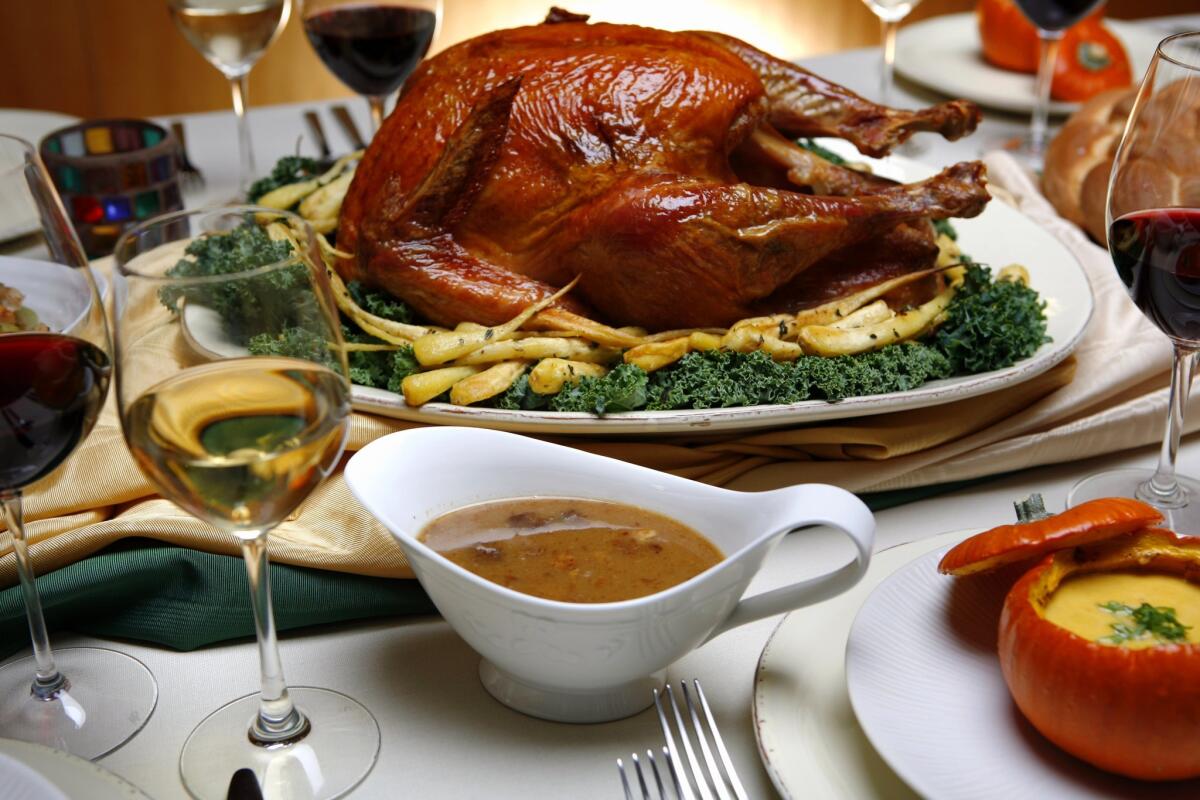How you feel about the Pilgrim story is a Thanksgiving Rorschach test

- Share via
One of the nation’s most-embraced founding stories involves the Pilgrims alighting from the Mayflower at Plymouth Rock, about 30 miles southeast of present-day Boston, where they “had now no freinds to wellcome them, nor inns to entertaine or refresh their weatherbeaten bodys, no houses or much less townes to repaire too, to seeke for succoure,” as Pilgrim William Bradford later wrote. Theirs wasn’t the first push by Europeans into America, but the story of the Pilgrims’ arduous early days has become an inextricable part of our lore.
It’s a warming morality tale about inter-reliance and generosity, underlined by the human impulse for independence and freedom. Yet, like many such stories, there are different versions. The simplest one frames it as a tale of Protestant separatists fleeing oppression who went to the New World in search of religious freedom, where welcoming natives shared their food during a harsh winter, saving the Pilgrims’ lives. That version is not entirely untrue, yet it omits how the Pilgrims viewed the natives. “[T]hese savage barbarians, when they mette with them … were readier to fill their [sides] full of arrows then otherwise,” Bradford wrote.
And it ignores the fact — which most Americans now recognize — that the Europeans had come to lands that were already occupied. Native Americans, unsurprisingly, view the Pilgrims as part of an invasion that led to the deaths of millions of their people across the Americas and robbed the survivors of their lands. The seizure of the Americas was part of a broader and mostly sordid history in which the leading European nations saw the rest of the world — its empires, monarchies, tribal areas and “heathen” peoples — as ripe for domination and exploitation.
Notably, a decade after the Pilgrims came the arrival of the Puritans, who paradoxically sought religious freedom but embraced an our-way-or-the-highway approach by punishing secularists and banishing perceived heretics. Freedom for me was not freedom for thee, apparently.
Still, though we know better, we generally embrace the rosy version of the Pilgrims’ arrival. Families gather around replica feasts centered on turkey and root crops, and give thanks for much more than the generosity of neighbors.
Yet some of the underlying themes of the Pilgrim story still echo in contemporary America. There is still a tension in the law and in society when the rights of the religious to follow their faith run up against the rights of others. Consider the case of the baker who didn’t want to make a wedding cake for a same-sex couple because doing so would violate his religious beliefs. The case went all the way to the Supreme Court. Or the case of religious hospitals that refuse to conduct medically accepted and necessary procedures because they conflict with their perception of Scripture.
Given our history, there is also no small amount of irony in the disdain many Americans today feel for immigrants and immigration. President Trump and his followers even warn of an invasion. If the movement of people from other countries to this one is an invasion, it’s been a long one, and it includes the people whose legacy we celebrate today.
Context, of course, is crucial. Those initial immigrants transformed, usurped or destroyed most of the societies they encountered, driven by a reflexive sense of white superiority and a tendency to see those who differed from them in skin tone, faith or nationality as somehow not human, and thus suitable targets for violence and oppression. You can hear the echoes in Trump’s comments and tweets describing some immigrants as “animals” and dismissing poor nations comprising people of color as “shithole countries.”
There have been dark and shameful moments in our history, and they should not be forgotten or misremembered. But we can also recognize the things we’ve done right. Over the generations, we have forged a society that is diverse and multicultural and, despite some obvious exceptions, broadly tolerant of different races, faiths and ideas. And we have made room for millions of immigrants, both refugees desperate for help and others seeking to become part of a society that runs on the rule of law and the constitutional promise of equal opportunity.
Maybe this year we should focus less on giving thanks and more on feeding hope. Hope for a more tolerant political and social discourse aimed at compromise and resolution, rather than competing noisome mobs in a standoff. Hope for a change in Washington, not just in the White House but in Congress as well, replacing ignorant intransigence with intelligence and open-mindedness. And hope for a nation that affirms by action the founding precept that all are created equal.
More to Read
A cure for the common opinion
Get thought-provoking perspectives with our weekly newsletter.
You may occasionally receive promotional content from the Los Angeles Times.









